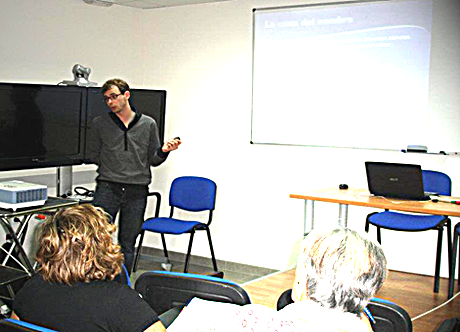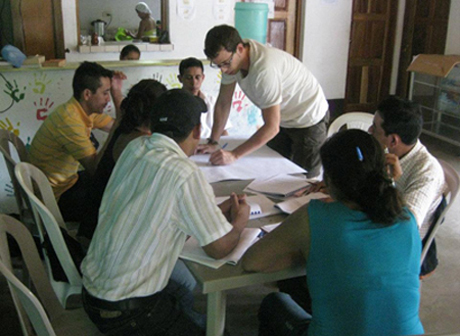Un altre mercat és possible?
Vaja per davant que jo sempre sospite dels "mercats", així en general i dels apòstates dels mercats en particular. Perquè habitualment sota la retòrica pro-mercats hi trobem gent que el que en realitat demana, ho sàpiga o no, és que els mercats no funcionen com suposadament haurien de funcionar, és a dir, demana que es liberalitzen i es desregulen. O siga, que es deixe camp obert a que els actors amb més poder dintre del mercat generen situacions d'
oligopoli o de col·lusió implícita, facen trampa, s'apropien de l'
excedent del consumidor, carreguen les seues
externalitats en la resta d'agents socials -presents i futurs-, eliminen la competència, aprofiten les assimetries d'informació en el seu favor, exploten els treballadors sense trabes i obtinguen beneficis extraordinaris de la
cerca de rendes. Tot això és negatiu per a la societat i per al funcionament de l'economia. I per supost del mercat, entés com s'enten en Introducció a l'Economia. Aleshores es dóna la paradoxa que els defensors dels mercats, generalment, aboguen pel malfuncionament dels mercats. El que cal no és
menys regulació sinó
millor regulació. De fet és paradigmàtic que els països que han progressat d'una manera contundent durant l'última dècada (Xina, Latinoamèrica, Sud-Est d'Àsia) ho hagen fet gràcies a una economia de mercat que
controla de manera efectiva el mercat, allunyats del Consens de Washington i de les recomanacions, no sempre inocents, dels fans dels mercats "lliures". Però. Però ho han fet, al capdavall, mitjançant el mercat.
Pobresa i Mercat
Les poblacions empobrides depenen del mercat per a quasi tot. Hi depenen per a la seua supervivència perquè és on hi venen el seu únic actiu, la seua força de treball. Hi depenen per a proveïr-se de béns i serveis, fins i tot aquells que a l'Occident estem acostumats a rebre per altres mecanismes: educació, sanitat, fins i tot l'aigua -sovint porta a porta. Llevat de pocs casos exitosos (Cuba i darrerament Veneçuela) aquesta dependència del mercat és molt més marcada entre els més pobres que en cap altre estrat social. L'imatge que hem de tenir, perquè és la realitat generalitzada, és la d'uns Estats amb una capacitat fiscal molt limitada que no és capaç d'arribar de manera efectiva, o en absolut, a capes molt amples de la societat i la presència d'ONGD internacionals que estan molt atomitzades i que tenen criteris sovint divergents.
Poc importa, llavors, si hom està "a favor" o "en contra" dels mercats per se -si és que aquesta posició no resulta ser igual que estar a favor o en contra de l'aire, de les mans esquerres o dels diners- perquè la realitat és que els mercats estan ahí, afecten els pobres d'una manera dramàtica, i és dintre del mercat on hem de buscar els mecanismes i les institucions que perpetuen les situacions d'exclussió i pobresa.
Si es preten actuar contra les causes i no els efectes de la pobresa és imprescindible una anàlisi potent dels mercats que marquen la vida de les poblacions objectius. I en aquest cas quan dic mercats vull dir Sistemes de Mercat, o siga no soles el nucli del mercat (diguem la clàssica oferta i demanda) sinó les normes -formals o informals-, les institucions, les funcions de recolzament -que són, a la seua vegada, altres mercats per dret propi-, la tecnologia, etcètera.
Sostenibilitat dels Projectes de Cooperació
Un dels majors handicaps de la cooperació és aconseguir la sostenibilitat, que en aquest context no és més que la permanència dels canvis una vegada finalitzada la intervenció. I hem de reconèixer que s'està fent, en general, malament. Massa sovint les intervencions generen dependència i són insostenibles, i el motiu principal és que es decideix actuar directament proveïnt un servei o un bé que es considera necessari -i de vegades ho és- sense plantejar seriosament com la societat receptora el podrà mantenir una vegada detès el finançament extern. No he vist cap projecte de cooperació que no parle de l'apropiació per part dels beneficiaris i de la sostenibilitat una vegada finalitzada la intervenció. Però escriure en una proposta és molt barat i les formulacions són agossarades. Si l'agència o ONG ha proveït directament el servei... qui el continuarà proveïnt després? I si hi ha un candidat clar a ocupar eixa funció, per què no se l'ha recolzat i preparat des del principi de la intervenció i ha sigut ell l'agent del canvi en lloc de l'organització externa?
La cosa és que massa vegades els projectes no tenen una incidència a llarg termini i quan la tenen aquesta pot perfectament ser negativa. No cal anar a casos d'elefants blancs -hotels en el no-res o pous que cal tancar perquè són un perill per als xiquets i una font d'infecció-. També poden tenir una incidència negativa perquè destrueixen estructures anteriors -que per molt informals o poc adaptades a la ideologia del cooperant en qüestió que siguen, funcionen- o senzillament impedeixen el desenvolupament de noves iniciatives endògenes.
M4P
Per tot això em pareix molt interessant l'estratègia
Making Markets Work for the Poor (M4P) proposada per l'Agència Suïssa de Cooperació i altres iniciatives similars, com els
Mercats Inclussius del PNUD. La clau per a mí està en un coneixement rigoròs i profund del sistema de mercat on es preten incidir, dels seus constrenyiments i de les seues millores potencials des d'una perspectiva
pro-Poor. I altre gran avantatge és que en lloc de prendre un paper protagonista dintre del nucli del mercat es recolza i facilita des de fóra, incidint en els agents que ja hi éren o els potencials nous participants locals. Un parell d'exemples: FIT-SEMA en Uganda va treballar amb les ràdios locals per garantir que la programació era de major qualitat i més útil per als oïents -programes sobre productivitat agrícola o preus dels productes, informació per altres tipus de negocis, etcètera. En lloc de comprar espais i insertar els seus programes com feien la majoria d'ONGD ells van recolzar la capacitat de les ràdios locals per produir-ne els seus propis orientats a les necessitats dels oïents. Resultat: més de 7 milions de nous oïents que reben una informació útil en les seues llengües i produïda per compatriotes seus. Katalyst en Bangladesh, front a l'escasa productivitat agrícola per pràctiques incorrectes i un ús inadequat dels insumos agraris, que tenia conseqüències directes en els ingressos i en la seguretat alimentària de la població, en lloc de fer els clàssics cursos de formació als llauradors locals, etcètera que tenen una incidència necessàriament petita i són poc sostenibles -una vegada finalitzada la intervenció no es pot arribar a nous beneficiaris-, va decidir recolzar la capacitat dels proveïdors de productes agraris -o siga, anant més amunt en la cadena de valor- per a que feren cursos a tots els seus agents, venedors de les xicotetes tendes locals, per a que estos, a la seua vegada, donaren informació i consell als llauradors que els hi compren els productes. D'aquesta manera l'impacte és molt major -1 milió de llauradors- i, una vegada les empreses proveïdores s'han apropiat del model, la sostenibilitat queda garantida.
L'estratègia té límits. Per exemple no pareix que siga la més indicada per a tractar temes de gènere, perquè des d'una perspectiva de mercat és difícil incidir-hi. El mateix pot passar amb temes ambientals, encara que això és menys clar -Soles cal pensar en els mercats de CO2-. A banda de que és una qüestió que ratlla la metafísica o si voleu, la ideologia, el fet de considerar que els Sistemes de Mercat ho abasten tot, o quasi, com els defensors de l'M4P proposen. Però la realitat és que els mercats estan molt presents a la vida dels pobres, i un enfocament que pose als mercats a funcionar per als pobres és clarament una aportació molt útil al debat, sempre acalorat, sobre la incidència, adequació i sostenibilitat de la cooperació.




















